Depending on the soil type, one cubic yard of dirt can weigh anywhere from 2000 to 2600 pounds. It will also depend on its moisture content and composition. In general, fill dirt and topsoil are heavier than lightweight dirt. Clay and gravel are also heavier than lightweight soil, so you may want to factor these factors in.
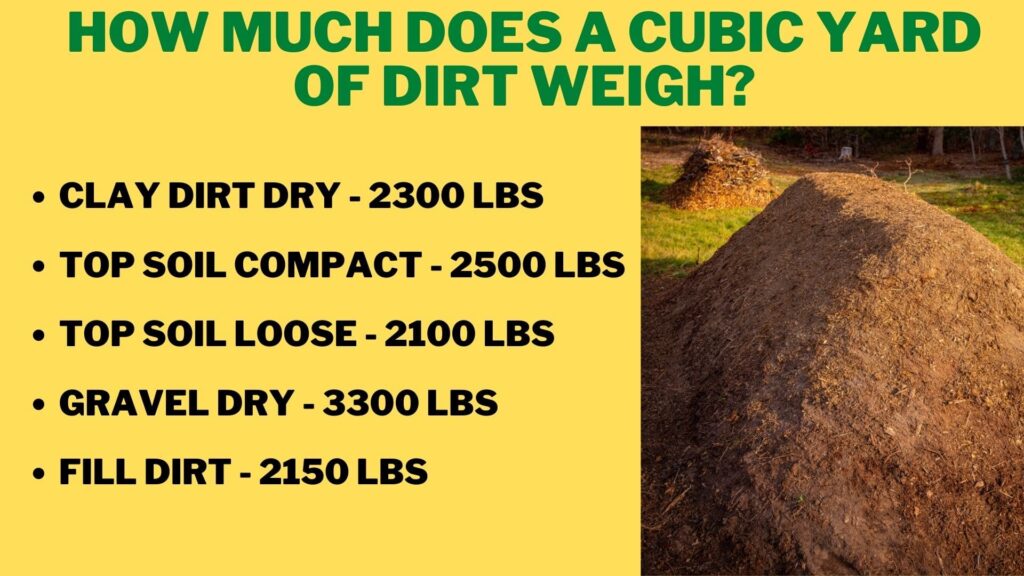
What Is A Cubic Yard Of Dirt?
A cubic yard is a unit of measure used to measure the volume of dirt. It is a volume equal to 3 feet long by 3 feet wide by 3 feet high. A cubic yard of dirt is approximately one short ton of dirt. A standard dump truck holds about 5 cubic yards of dirt, while some companies offer larger trucks that hold up to 10 cubic yards. Typically, a cubic yard of dirt covers a 10-foot by 10-foot area with about 3 inches of dirt.
Using a cubic yard calculator can help you calculate how much material you need to fill a certain space. The basic method is to measure the space in feet, multiply it by 27 to calculate the total volume. If the area is irregularly shaped, then you might need more material.
A yard of dirt is equal to 0.7 cubic feet of topsoil, which weighs about 1.5 tons. One cubic yard of topsoil weighs about 1,800 pounds, while a cubic yard of gravel weighs about 2,000 pounds.
How Much Does A Yard Of Dirt Weigh?
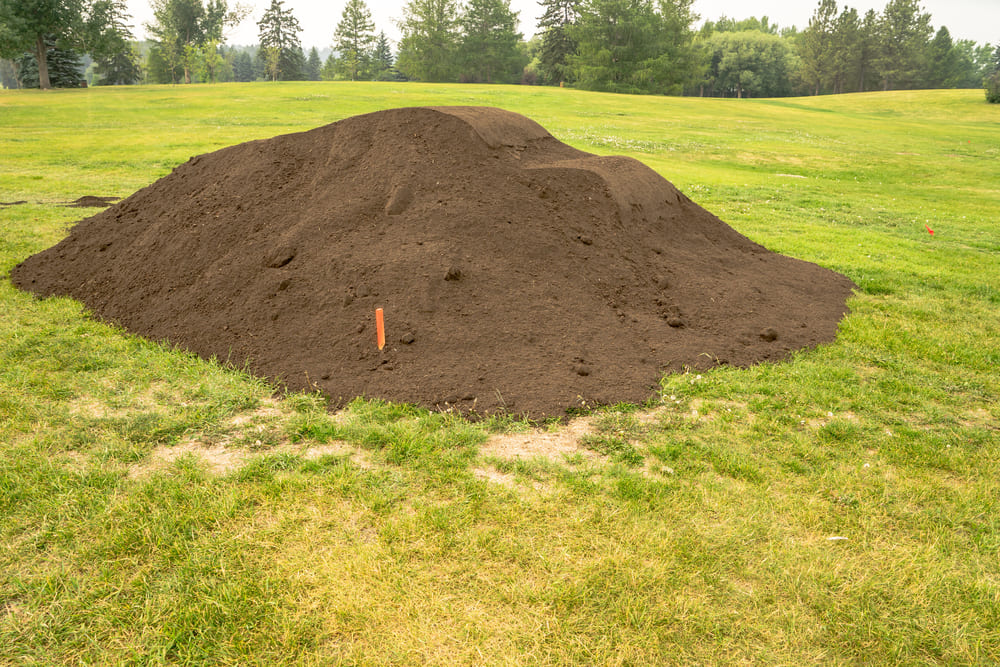
The weight of a cubic yard of dirt depends on the amount of moisture in it. A dry cubic yard of soil will weigh about 2,000 pounds, while wet soil weighs more than three times that amount. To avoid having to carry a large amount of water, purchase soil on a dry day. This will make it easier to unload and haul.
A yard of dirt may contain several different materials: topsoil, fill dirt, sand, gravel, loose sand aggregate, and organic material. The moisture content of topsoil, the amount of compaction, and the particle size all determine the weight. Therefore, when purchasing dirt, make sure to check the type before buying it.
Depending on the moisture content, dry sandy soil can weigh as much as 2,200 pounds. Clean fill, on the other hand, weighs around two hundred and twenty-five pounds. Soil weight can be a little higher or lower, but an average cubic yard of dirt weighs around two hundred pounds.
Average Weight Of A Cubic Yard Of Dirt
When you are buying dirt, it is important to know the average weight of a cubic yard. This will help you avoid purchasing too much soil and damaging your trailer. The weight of dirt varies depending on the type, moisture content, and composition of the soil. It can weigh up to three thousand pounds per cubic yard.
The average weight of a cubic yard of dirt depends on the type of dirt used and its consistency and density. Soil that is light and spongy usually weighs less than a yard, while stiff clay or gravel is heavier. The weight of the dirt will also depend on its moisture and other materials.
A cubic yard of dry topsoil weighs about two hundred pounds. However, a yard that is saturated with water can weigh more than three thousand pounds. It is best to buy dirt on a dry day. This will make the dirt lighter and easier to unload. Also, it will be easier to move the dirt once you get it home.
A cubic yard of dirt is a volume of soil that is approximately 27 cubic feet. It is commonly used for gardening, construction, and landscaping projects. A cubic yard of fill dirt weighs less than a cubic yard of concrete. For this reason, it is typically sold in large quantities.
The average weight of a cubic yard of dry, loose dirt is between two hundred and one-and-a-half tons. One cubic yard of dry, loose dirt can cover three hundred square feet at a depth of three inches. Prices for dirt vary depending on the type of dirt you need. Fill dirt and topsoil are generally priced between $12 and $100 a cubic yard, and certified fill can cost $100 or more.
The weight of dirt varies according to its composition and moisture content. Some types of fill dirt are very light and have a low density, while topsoil is more dense and contains more moisture and organic matter. Therefore, it is important to know the weight of a cubic yard of dirt so you can properly load it into your truck.
The weight of topsoil varies widely. It can weigh up to two thousand pounds or even more depending on the moisture content and composition. As a general rule, a cubic yard of topsoil should weigh around 2,000 pounds. However, you can also find dirt in cubic foot bags.
Average Weight Of Topsoil
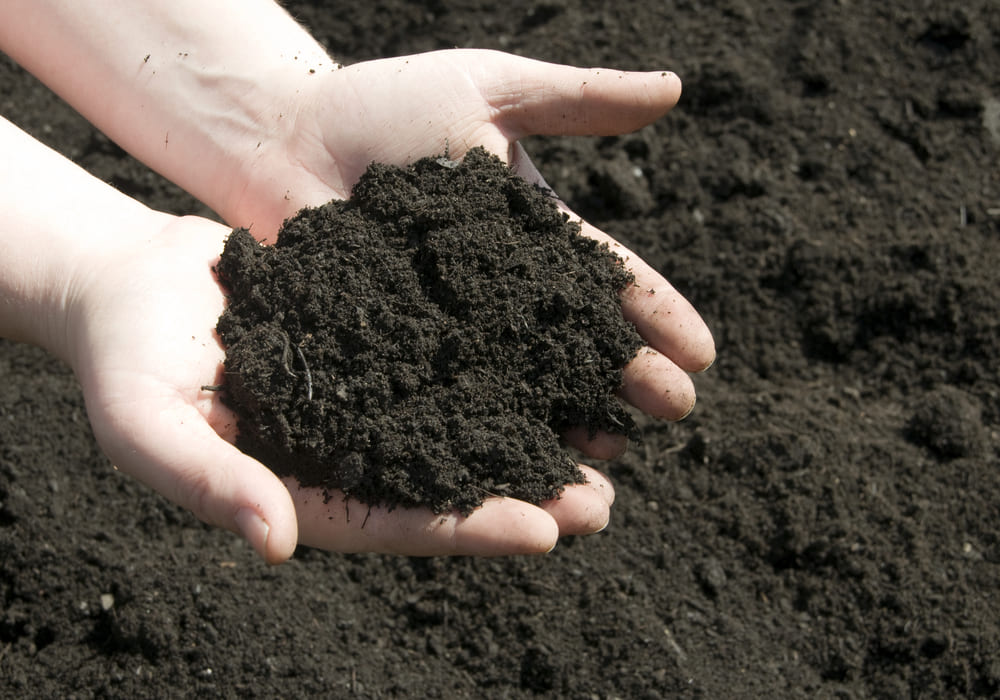
Topsoil can vary in weight depending on its moisture content and composition. A dry topsoil will weigh about half as much as a saturated topsoil. The amount of organic matter in the soil can also affect its weight. The higher the organic matter, the heavier the soil will be. Compaction is also an important factor to consider. A dense topsoil is more compacted than a loose one.
The weight of topsoil can vary greatly depending on the specific composition and location of the soil. A cubic yard of topsoil weighs around two thousand pounds, while a cubic yard of dry clay soil weighs around one thousand pounds. The exact weight depends on the type of topsoil, so you should always check the weight of topsoil before you buy it.
Topsoil weighs between 1,200 and 1,700 kilograms (about 2,640 and 3,747 pounds). Soil density depends on its moisture content. Loose, dry topsoil weighs approximately 1.22 metric tonnes and moist topsoil weighs about 1.25 metric tonnes.
Whether you’re looking to fill a garden bed or make raised garden beds, topsoil is a versatile material. It can also be used to repair erosion and fill holes. It’s best to thin a layer of topsoil before you plant grass or plants.
The weight of topsoil varies depending on the moisture content and location of the topsoil. A cubic yard of dry topsoil can weigh two hundred pounds, while a cubic yard of saturated topsoil weighs more than three hundred pounds. Buying soil by the cubic yard is a better option because it will be lighter to transport and to unload.
Topsoil comes in bags of 40 pounds. These bags are easy to handle and provide enough topsoil to cover a ten-square-foot area. The soil will be about three inches deep. The 40-pound bag should be enough for most gardening projects. If you need more topsoil, you can mix wood chips and compost with it.
The weight of topsoil is usually between one and two cubic feet per cubic yard. In some cases, a cubic foot of topsoil can weigh up to eighty pounds. The weight of topsoil is determined by the amount of moisture and debris that is in it. It may cost $12 to fifty dollars a cubic yard. The cost of topsoil can vary between two cubic yards, and the cost to transport a cubic yard of topsoil can run up to $40.
The average weight of topsoil varies, but it is generally in the range of one to three-cubic yards. If you are looking to buy topsoil, it is important to know its weight and where to find it. You can also look at its moisture content to help you choose the right topsoil for your needs.
When transporting topsoil, you should always consider the weight capacity of your vehicle. A small wheelbarrow can easily handle three to four cubic feet of topsoil, but a large truck can handle up to 10 cubic yards.
How Much Does 1 Yard Of Dirt Weigh?
The weight of a yard of dirt varies based on the type and condition of the soil, moisture content, and the amount of organic material mixed in. The average yard of dirt weighs about 2,200 pounds or 1.1 short tons. The weight of fill dirt, which is commonly used for construction projects, tends to be lighter than other types of soil.
Dirt is usually priced by the yard, not the ton. This is because moisture is a factor in its weight, so buying dirt by weight would be a waste of money. It is also important to understand the weight of dirt if you’re planning to transport it. Most full size pickups can tow up to 7,000 pounds of dirt, but a yard will weigh considerably more.
Choosing a vehicle that can haul the soil is an important decision. Whether you plan to haul it yourself or hire a truck delivery service, you must consider how much soil you can reasonably haul. If you plan to haul a large amount of dirt, it’s best to choose a vehicle with a low payload rating and a trailer that can handle the weight.
How Much Does 2 Yards Of Dirt Weigh?
Dirt is a heavy material. A yard of dirt weighs about 2200 pounds. 2 cubic yards of dirt weighs around 4400 lbs or 2.2 short tons. so for 2 yards of dirt weighs = 2200×2 = 4400 pounds or 2.2 tons.
A Cubic Yard Of Dirt Stats

A cubic yard of dirt is a measurement that measures the total area of debris. This measurement is based on length, width, and height. A cubic yard contains approximately 27 cubic feet. Hence, a cubic yard of dirt is approximately 3 yards long, one yard wide, and three-quarters of a yard deep.
In simple terms, a yard of dirt is equal to 2,000 pounds. Using this unit, you can determine how much dirt you need. A yard of dirt can be bought for a lot of different purposes. For example, you can use it to fill in areas around the foundation of a building or other structures. However, this type of dirt is not suitable for growing plants as it does not contain enough organic matter. For this reason, you need to add a layer of topsoil to this type of dirt before you can start planting.
One cubic yard of dirt weighs around 2100 pounds, or 1.3 tons. This amount of dirt is enough to cover about three hundred square feet, assuming that it is three inches deep. The price of a cubic yard of dirt depends on its type. Topsoil and fill dirt cost around $7 to $12 per cubic yard. Certified fill, on the other hand, can cost $100 or more per cubic yard.
The weight of a cubic yard of dirt varies depending on the type of soil used. Topsoil is typically heavier than fill dirt. Clay, sand, and stones are heavier than topsoil, so the weight of a cubic yard of clay, gravel, or sand will vary depending on its moisture content and composition.
How Much Does Dirt Weigh Per Yard?
The weight of one cubic yard of dirt varies, depending on the type of dirt, moisture content, and mix of organic and inorganic materials. Typically, a cubic yard of dirt weighs between 1,080 and 3,500 pounds. Of course, the exact weight will depend on the exact soil conditions, including its density, so it’s best to ask the company you’re purchasing it from before buying it.
Dirt weighs a lot more than you may think. The average cubic yard of topsoil weighs about 2,000 pounds. However, when it’s wet, the soil can weigh up to three times that amount. This makes it important to buy dirt on a dry day, as it’s lighter to carry, and much easier to unload.
Topsoil can weigh as much as 2,500 pounds per cubic yard, while dry clay soil can weigh more than 1,700 pounds. Topsoil and clean fill will weigh closer to 2100 pounds per cubic yard. It’s important to know your truck’s maximum towing capacity, and load it slowly and closely, so you don’t overload it or get stuck.
Topsoil is a common type of soil. Knowing how much topsoil weighs per cubic yard is important for anyone who works with topsoil on a regular basis. The weight of topsoil is important for loading trucks and trailers, so it’s a good idea to check the manufacturer’s manual to determine what’s right for your needs.
How Much Does Blended Soil Weigh Per Yard?
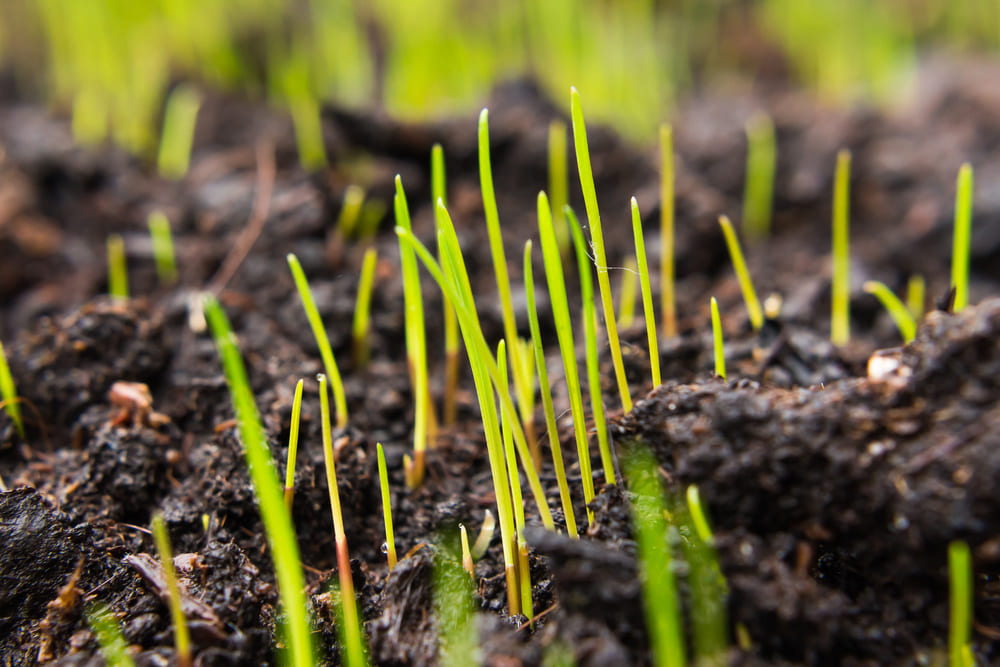
When you purchase topsoil for landscaping projects, you might be wondering, “How much does blended soil weigh per cubic yard?” This question can be tricky to answer because the weight of blended soil varies depending on its moisture content and other factors. In order to get an accurate answer, you should check the weight of the soil you are planning to purchase on a dry day.
Blended soil typically weighs less than pure topsoil because it contains wood chips and compost, which add moisture and nutrients to the soil. Additionally, it provides better drainage. The weight of blended soil is about 500 pounds less than pure topsoil. The percentage of additional materials will also affect the weight. For example, a 3/4 topsoil/4-compost blend contains 75% topsoil and 25% compost.
To calculate the weight of blended soil, divide the square footage of your yard by the desired thickness. Then, multiply the result by 100 to get the weight of the soil. It will weigh anywhere from 1.0 to 1.3 tons per cubic yard. This simple equation is particularly useful when transporting soil from one place to another.
The weight of blended soil varies greatly, largely due to the moisture content and the texture. A cubic yard of dry topsoil weighs around 2,000 pounds while a cubic yard of saturated soil can weigh as much as 3,000 pounds. Therefore, when you buy topsoil, be sure to purchase it on a dry day.
Wet Vs Dry Dirt Weight
When you are preparing your garden soil, it’s important to know how much dirt weighs. Different kinds of soil have different weights depending on what they contain, including clay, sand, or water. Usually, the dirt you use is clean and free of rocks and debris. It weighs between 1,080 and 2,200 pounds per cubic yard.
The weight of a cubic yard of dirt depends on the consistency and density of the soil. A cubic yard of dry dirt weighs two hundred to two hundred and fifty pounds, while a cubic yard of wet dirt can weigh over three thousand pounds. The weight of dirt varies depending on its composition, which can include large stones, organic matter, clay, or sand. In addition, the weight can increase if the soil has been compacted.
Generally, a cubic foot of top soil weighs between 74 and 110 pounds. However, this amount varies when topsoil is mixed with dirt. When moist, top soil weighs between 76 and 78 pounds per cubic foot. In addition, dry clay weighs more than wet soil.
Wet dirt is heavier than dry dirt because it contains water. A yard of wet dirt can absorb more than 100 gallons of water. In contrast, a yard of dry fill can weigh around 2900 pounds. This amount of dirt is more dense than topsoil, which is made of loose dirt. Clean fill is cheaper than topsoil, but you’ll have to pay for delivery. It costs around $150 for a dump truck load.
How Many Cubic Yards Of Dirt Do I Need?
To determine how many cubic yards of dirt you need, first measure the area that needs to be filled. This will require the measurement of the length, width, and depth of the area. For example, a 120-inch square needs 120 cubic yards of dirt. The same applies to a 60-inch square. Then, take the length, width, and depth measurements, and multiply them together. This should give you 216,000 cubic inches.
If you are building a raised bed or planter, or planning to build a container vegetable garden, a simple soil volume calculator can help you determine how much soil you need. This calculator can also be used for compost or mulch. Using the graphic below, you can determine how many cubic yards you’ll need for your new landscape bed.
In addition to knowing how many cubic yards you need, determining how much material you need will be easier if you have a tape measure. You can also use an online calculator to get an accurate estimate. These calculators are fun to use and provide instant results. They also don’t require a lot of redundant information.
In addition to a yard, a cubic yard is also a measure of volume. It is important to know the dimensions of a material before you purchase it. For example, three yards by one yard by three feet equals a cubic yard. Therefore, if you want to build a raised bed, you should multiply three feet by one and then multiply three by three to get the total amount of cubic yards you’ll need.
Will A Yard Of Dirt Fit In A Pickup Truck?
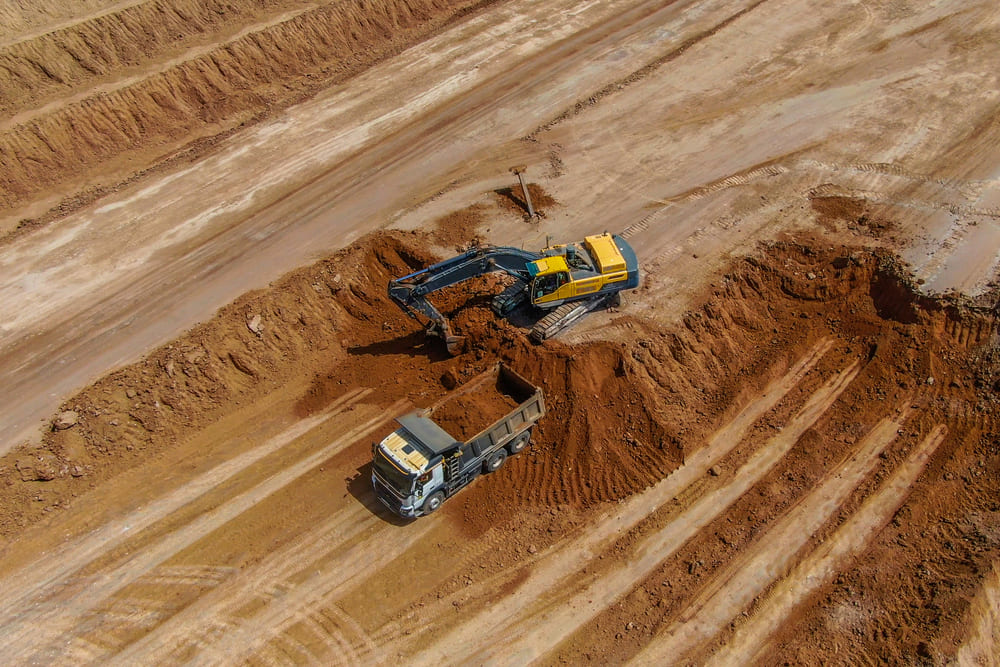
A yard of dirt is approximately 27 cubic feet. This is equivalent to about nine wheelbarrow loads. The dirt weighs anywhere from 0.8 to 1.5 tons. It will easily fill the bed of a full-sized pickup truck. Smaller pickups can only handle about one cubic yard of dirt.
Dump trucks are large vehicles designed to transport large amounts of loose material. The total volume of a dump truck is usually about ten to sixteen cubic yards. The truck’s weight limit is what determines how much material it can transport. However, a typical pick-up truck’s bed has a maximum capacity of about 1.5 to three cubic yards.
A half-ton pickup truck has a payload capacity of about 1000 pounds. This means it can safely carry two cubic yards of dirt, depending on its density and thickness. However, a full yard of dirt would be dangerous to transport in a half-ton pickup truck.
When ordering loose materials, the size and weight must be taken into account. Usually, construction materials are sold in cubic yards. Knowing how much material to order and how to haul it can be a tricky process. Here are some basic rules to help you figure out how much material you will need.
Firstly, it’s important to know how much dirt your pickup can handle. Most pickups are capable of carrying three cubic yards of mulch or other lightweight materials. The size of your pickup depends on its capacity, but a small pickup truck may be able to fit a cubic yard of mulch.
The Average Cubic Yard Of Dirt Weight
The weight of a cubic yard of dirt is very variable. It depends on many factors, including the type of dirt and its moisture content. This article will look at some of the factors that impact the weight of dirt and how to estimate its weight. This can save you from trouble during pricing and transportation.
The average cubic yard of dirt weighs between 1,080 and 3,500 pounds, and it depends on its density and moisture content. Topsoil, for instance, weighs more than filler dirt, which tends to weigh about 1,000 pounds per cubic foot. Soil that is compacted is also heavier than dirt that is dry.
The weight of topsoil, sand, and clay varies. Sand weighs around 2,000 pounds per cubic yard, and stiff clay weighs more than sand. When wet, it can weigh up to 3,000 pounds. The weight of soil with wood chips or compost will vary. This is why it’s important to know what type of dirt you’re buying.
Dirt is made up of different components such as sand, clay, and rocks. The average cubic yard of dirt weighs between 2100 and 2200 pounds, depending on its moisture content and other characteristics. When hauling dirt, you should consider your truck’s towing capacity. Also, load dirt slowly and keep track of the weight.
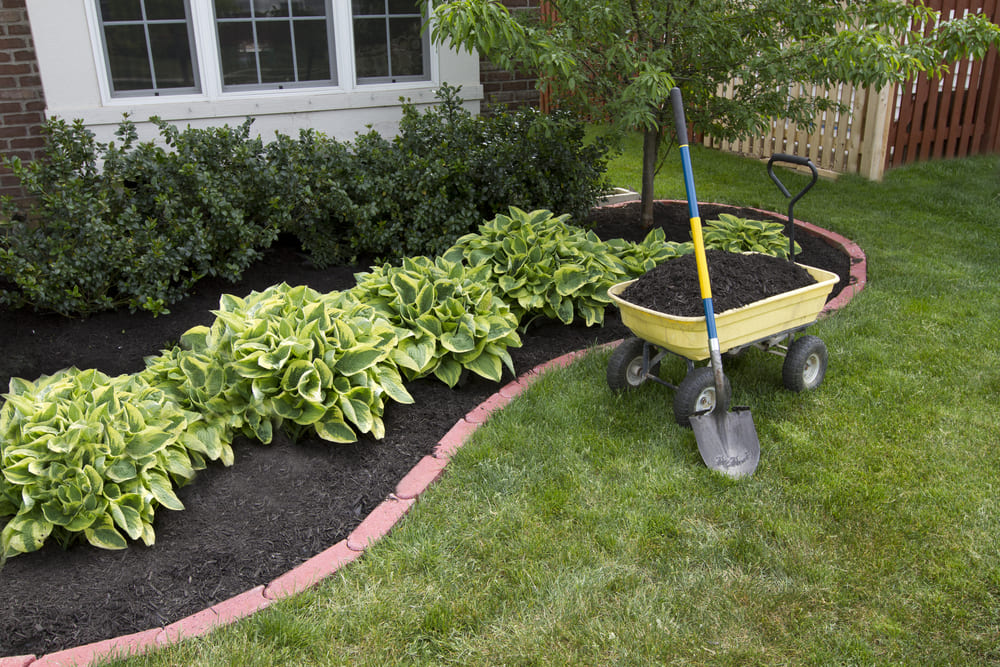
Moving A Cubic Yard Of Soil
Moving a cubic yard of soil is not easy, especially if you do not have a large vehicle. However, providers usually include delivery charges in the price of their bulk products. To find out how much soil you need, measure the area of your property by multiplying its length and width. Then, multiply the amount by three to find the cubic yard equivalent in square feet.
The weight of a cubic yard of soil varies depending on the composition and moisture content. For example, topsoil is heavier than filler dirt. As a result, one cubic yard of soil weighs anywhere from 1,080 to 3,500 pounds. If the soil is filled with gravel or clay, it will weigh much more than light dirt. Therefore, you’ll want to consider how much soil you’re moving before you begin.
You can use wheelbarrows to move a cubic yard of soil. One medium-sized wheelbarrow can hold about 1/9th of a cubic yard of soil. However, it’s best to invest in a trailer if you intend to transport the soil over a long distance.
Conclusion
The weight of a cubic yard of dirt varies depending on the type and composition of the dirt. Different types of dirt contain different amounts of moisture and other materials. Fill dirt, for example, is extremely light because it has been excavated deep within the earth, while topsoil has a higher concentration of organic matter and moisture. A cubic yard of dirt with a high sand content will weigh less than a cubic yard with a high clay content.
A cubic yard of dirt contains about 2200 pounds of dirt. The weight of the dirt is much less than the weight of a full-sized truck, but it is still a significant amount. If you have to transport dirt, make sure you have the proper vehicle to tow the load. It is also essential that you know your vehicle’s towing capacity and make sure you load the dirt slowly and monitor the weight as you go.
There are various components of soil, such as decomposed organic matter and living organisms. All these factors affect the weight of a cubic yard of soil. For instance, topsoil can weigh up to 2600 pounds while dry clay soil can weigh around 1800 pounds. Therefore, the weight of a cubic yard of soil will depend on the soil type and composition. The more moisture the soil has, the heavier it will be.
